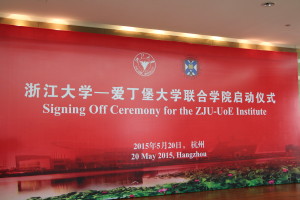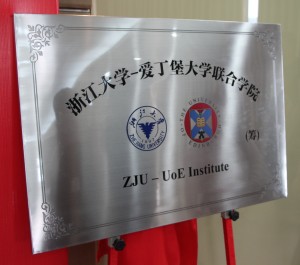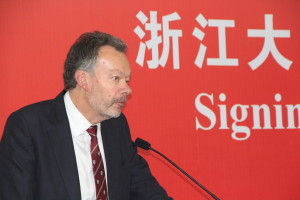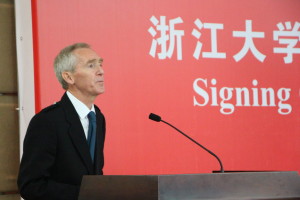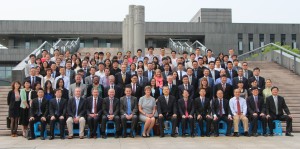By Professor Mike Shipston, Dean of Biomedical Sciences, the University of Edinburgh
I was delighted to be present at the unveiling of the new Zhejiang-Edinburgh institute at a ceremony in Hangzhou on Wednesday.
In front of a packed audience of students, Edinburgh and Zhejiang faculty, Chinese and local Government officials and invited special guests in Zijingang Hall on the Zhejiang campus, the unveiling of the joint institute was performed by Deshui Jin, Secretary of Party Committee, Zhejiang University and Charlie Jeffery, Senior vice-Principal, Edinburgh.
The ceremony was opened by the President of ZJU, Zhaohui Wu, who emphasised the truly unique venture to establish an institute that aims to deliver China’s first joint undergraduate degree programme in Biomedical Sciences and research institute with postgraduate MSc and PhD programmes.
This new initiative will see a teaching programme and research facility being developed on the new international ZJU campus at Haining.
The agreement with Edinburgh is the first such joint initiative established by Zhejiang.
The rapid development of the institute followed the first Hangzhou-Edinburgh joint research symposium in 2011 organised by Mark Evans, Chair of Molecular Pharmacology at Edinburgh.
UoE Assistant Principal Jeremy Bradshaw discussed the long and proud history of the two institutions including the role of one of UoE’s former students, david Duncan Main, who helped establish one of the founding hospitals of ZJU Medical School in the 1800’s.
Barbara Woodward, the British Ambassador to China , emphasised the unique joint initiative and its role in the broader global impact of the UK and China in education and research. This represented a model for the long term development of increasing collaboration between the two countries.
Following the unveiling of a plaque to mark the signing off ceremony, the Executive vice-President of ZJU, Yonghua Song, announced the nominated Executive Dean of the new Joint Institute as Jon Stewart the current Director of Edinburgh’s Biomedical Teaching Organisation.
In his speech, John, appropriately resplendent in full Scottish regalia of woollen kilt, even in the humid afternoon, highlighted the enthusiasm and close cooperation between the two Universities to establish the Institute in a very short time frame. He conveyed his honour and excitement at driving forward the development of the Institute in this new role.
He called on all parties to embrace this unique venture that will be a global beacon for biomedical science training that will generate the new wave of globally competitive students in biomedical sciences who will be the leaders of the future.
The enjoyable event ended with a photo opportunity on the steps of the ZJU campus – with most of the students just wanting a private photo with John!
The future of the Joint Institute looks bright!

